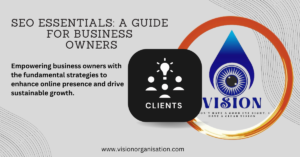SEO Essentials: A Guide for Business Owners:
In today’s digital age, business owners without a strong online presence risk being left behind. Consumers rely heavily on the internet to find products and services, so a well-established web presence is crucial for survival. But with countless competitors vying for attention online, how do you cut through the noise and ensure potential customers can find your website? Here’s where SEO (Search Engine Optimization) steps in to help. SEO is a set of strategies that can significantly improve your website’s visibility.
Think of SEO as the art of getting your website noticed by search engines like Google. By implementing specific strategies, you can optimize your website’s content and structure to rank higher for relevant keywords that your target audience is searching for. In simpler terms, the better your SEO, the more likely your website is to appear at the top of search engine results pages (SERPs) when people search for products or services related to your business. This prime position translates into a significant advantage: organic traffic.
Organic traffic refers to visitors who find your website naturally through search engines, rather than through paid advertising. By ranking higher in search results, you’re essentially attracting a stream of potential customers who are already interested in what you offer. This targeted traffic can lead to increased sales, conversions, and overall business growth.
While SEO can seem complex, here’s a breakdown of the essentials every business owner should understand:
Search engines prioritize websites with valuable, informative content that caters to user intent. This means ditching keyword-stuffed articles and focusing on creating well-written, engaging content that solves your target audience’s problems.
Keyword Research: Identify the terms people use to search for your offerings. Tools like Google Keyword Planner can help you discover relevant keywords with good search volume but lower competition (long-tail keywords).
Content Strategy: Develop a plan to create informative blog posts, helpful guides, or answer frequently asked questions (FAQs) on your website. Consistently update your content to ensure it remains fresh and relevant.
Technical SEO: The Foundation
Even the most compelling content won’t rank well if search engines can’t crawl and understand your website. Here’s what you need to consider:
Website Speed: A slow loading website frustrates users and hurts SEO. Optimize images, minimize code, and consider caching solutions for faster loading times.
Mobile-friendliness: With most searches now happening on smartphones, ensure your website offers a seamless experience on all devices. Make your website mobile-friendly with responsive design.
Site Navigation: Make it easy for users and search engines to navigate your website. Clear menus with relevant categories and internal linking (linking between pages on your website) helps search engines understand your website structure.
Metadata: Optimize page titles and meta descriptions, which are short summaries displayed in search results. Include relevant keywords but keep them concise and informative. Business Owners.
Building Authority: Backlinks and Beyond
Backlinks are basically references from other websites that link back to your site. Search engines see them as a sign of trust and authority, influencing your website’s ranking. Here are ways to build backlinks:
Guest Blogging: Write informative articles for relevant websites in your niche and include a link back to your website. Business Owners.
Industry Directories: Submit your website to high-quality online directories within your industry.
Social Media Promotion: Share your content on social media platforms to boost brand awareness and potentially gain backlinks from others who share your content. Local SEO for Brick-and-Mortar Stores:
Brick-and-mortar businesses need local SEO to rank higher in local searches. Here’s how to optimize your digital presence for local searches:
Google My Business: Claim and optimize your Google My Business listing, ensuring your business name, address, phone number (NAP) and category are accurate and consistent across the web.
Online Reviews: Encourage customers to leave reviews on Google My Business and other platforms. Positive reviews build trust and enhance local search rankings.
SEO isn’t a one-time fix. Search engine algorithms are constantly evolving, so stay updated on the latest trends and best practices. There are many free and paid SEO tools available to help you track your website’s performance and identify areas for improvement.

Conclusion: Remember: SEO is a long-term strategy. By focusing on high-quality content, technical optimization, and building your online authority, you can gradually improve your website’s ranking and attract more organic traffic, ultimately leading to more customers and business growth. Business Owners.
For further exploration: Consider attending SEO workshops or webinars offered by digital marketing agencies or industry associations. There are also many online resources and SEO guides available to delve deeper into specific aspects of SEO.
